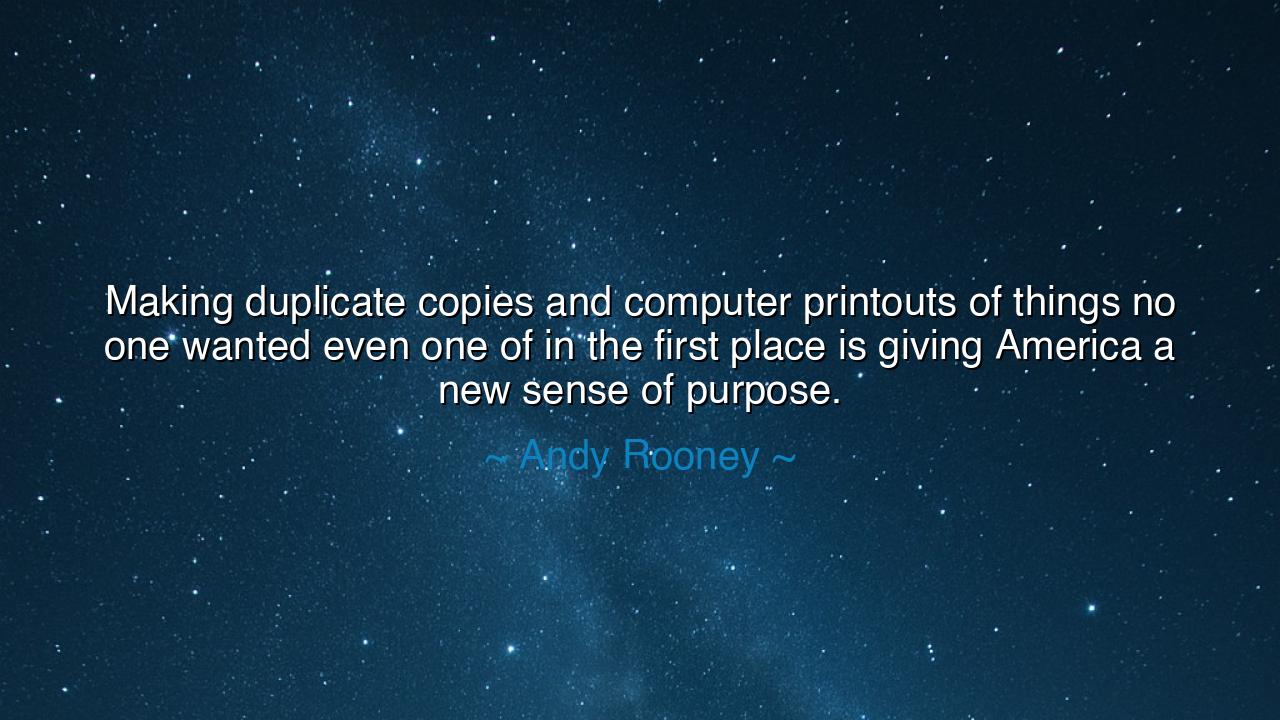
Making duplicate copies and computer printouts of things no one
Making duplicate copies and computer printouts of things no one wanted even one of in the first place is giving America a new sense of purpose.






Hear the satirical wisdom of Andy Rooney, who once observed: “Making duplicate copies and computer printouts of things no one wanted even one of in the first place is giving America a new sense of purpose.” These words, clothed in humor, reveal a deeper truth about the age of machines: that humanity, armed with wondrous tools, often multiplies not meaning, but futility. Rooney, master of irony, was not merely mocking technology, but pointing to the human tendency to confuse productivity with purpose, volume with value.
The essence of his jest lies in the absurdity of copies. What use is it to duplicate endlessly that which was never wanted in the first place? Yet this is the folly of unchecked automation: when the cost of reproduction falls to nearly nothing, we risk filling the world with emptiness. Where once a single document required careful thought, labor, and ink, the computer now allows millions of pages to be printed with the push of a button—regardless of whether those pages hold truth, wisdom, or even relevance.
This is not a problem of technology alone; it is a problem of human nature. In the days of the printing press, pamphlets of great value were born—sermons, political tracts, revolutionary manifestos—but alongside them came floods of trivial, useless, or even poisonous works. In every age, the ability to multiply has brought both power and peril. Rooney’s sharp eye saw that in the modern office, printouts often served as monuments not to insight, but to bureaucracy—reports unread, memos unwanted, data piled upon data until meaning was lost.
Consider the tale of the Pentagon Papers, thousands upon thousands of pages compiled, duplicated, and stored. Though the information was critical, for years it lay buried in the weight of its own excess, unread by the very citizens whose lives it shaped. It was only when revealed by whistleblowers that the mountain of paper became meaningful. Here we see the truth of Rooney’s words: duplication without discernment buries truth rather than reveals it.
Yet his words also echo beyond the paper of his time into the digital flood of our own. The Internet, that boundless copier of words and images, magnifies the problem a thousandfold. Millions of posts, messages, and documents are generated each hour, most of which no one asked for, few of which are needed. The result is distraction, noise, and the illusion of purpose in the endless production of the unnecessary. Thus Rooney’s humor becomes prophecy: in chasing the multiplication of the trivial, humanity risks losing sight of the essential.
But, O listener, do not despair. The lesson is not to reject technology, but to return to discernment. Ask yourself: before you copy, print, post, or share—is this needed? Is this meaningful? Does this bring light or only add to the noise? For true purpose lies not in the number of pages produced, but in the clarity and truth of the thought behind them. Quality, not quantity, is the foundation of wisdom.
Practical steps follow: resist the temptation to generate without reflection. Guard your speech and your writing, so that what you produce is worthy of the eyes that will receive it. In the age of infinite copies, let your words be rare jewels, not grains of sand lost in the flood. And above all, remember that purpose cannot be manufactured by machines—it is found only in the intent of the human heart.
Thus, let Rooney’s humor become your guide. “Making duplicate copies of things no one wanted...” is not purpose, but parody. True purpose is born of thought, of intention, of meaning chosen carefully before it is multiplied. Let your life, like your words, be not a flood of excess, but a wellspring of truth. For in a noisy world, the voice of wisdom shines brightest when it is rare.






AAdministratorAdministrator
Welcome, honored guests. Please leave a comment, we will respond soon